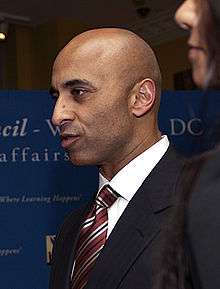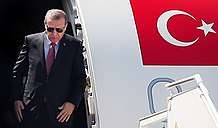Qatar diplomatic crisis
The Qatar diplomatic crisis began on 5 June 2017, when Saudi Arabia, the United Arab Emirates, Bahrain and Egypt severed diplomatic relations with Qatar and banned Qatar-registered airplanes and ships from utilising their airspace and sea routes along with Saudi Arabia blocking Qatar’s only land crossing. They were later joined by Jordan and were supported by the Maldives, Mauritania, Senegal, Djibouti, the Comoros, the Tobruk-based government in Libya, and the Hadi-led Yemeni government.[6][7]
| Qatar diplomatic crisis | |||||||
|---|---|---|---|---|---|---|---|
| Part of Qatar–Saudi Arabia proxy conflict and Iran–Saudi Arabia proxy conflict | |||||||
| |||||||
| Parties involved in diplomatic dispute | |||||||
|
Others: No longer participating: |
Supported by: | ||||||
|
a The Government stationed in Aden has cut ties with Qatar. b The Tobruk-based government lost international recognition after the formation of the Government of National Accord in January 2016. The Tobruk-based government claims to have cut ties with Qatar despite not having diplomatic representation in the country. c Somaliland's independence is not recognized by the international community. | |||||||
The Saudi-led coalition cited Qatar's alleged support for terrorism as the main reason for their actions, insisting that Qatar had violated a 2014 agreement with the members of the Gulf Cooperation Council (GCC), of which Qatar is a member.[8] Saudi Arabia and other countries have criticized Al Jazeera and Qatar's relations with Iran. Qatar acknowledges that it has provided assistance to some Islamist groups (such as the Muslim Brotherhood), but denies aiding militant groups linked to al-Qaeda or the Islamic State of Iraq and the Levant (ISIL).[9] Qatar also claims that it has assisted the United States in the War on Terror and the ongoing military intervention against ISIL.[10]
Initial supply disruptions were mitigated by additional imports from Iran and Turkey, and Qatar did not agree to any of the Saudi-led coalition's demands.[11] The demands included reducing diplomatic relations with Iran, stopping military coordination with Turkey, and closing Al-Jazeera.
On 27 July 2017, Qatari foreign minister Mohammed bin Abdulrahman Al Thani told reporters that Egypt, Saudi Arabia, United Arab Emirates and Bahrain were showing "stubbornness" to Qatar and had not taken any steps to solve the crisis. Al Thani added that the Security Council, the General Assembly and "all the United Nations mechanisms" could play a role in resolving the situation.[12] On 24 August 2017, Qatar announced that it would restore full diplomatic relations with Iran.[13] As of June 2020, a diplomatic solution had still not been reached.[14]
Background
Since he took power in 1995, Hamad bin Khalifa al-Thani believed Qatar could find security only by transforming itself from a Saudi appendage to a rival of Saudi Arabia.[15] Saudi Arabia withdrew its ambassador to Doha from 2002 to 2008 to try to pressure Qatar to curb its individualistic tendencies. This approach broadly failed.[16] The Arab Spring left a power vacuum which both Saudi Arabia and Qatar sought to fill, with Qatar being supportive of the revolutionary wave and Saudi Arabia opposing it; since both states are allies of the United States, they avoid direct conflict with one another.[17] Qatar has had differences with other Arab governments on a number of issues: it broadcasts Al Jazeera; it is accused of maintaining good relations with Iran; and it has supported the Muslim Brotherhood in the past.[18] Qatar has been accused of sponsoring terrorism. Some countries have faulted Qatar for funding rebel groups in Syria, including al-Qaeda’s affiliate in Syria, the al-Nusra Front,[19] although the Saudis have done the same.[20][21] Qatar has allowed the Afghan Taliban to set up a political office inside the country.[22] Qatar is a close ally of the United States, hosting the largest American base in the Middle East, Al Udeid Air Base.[23]
March 2014 GCC Crisis
In March 2014, Saudi Arabia, the United Arab Emirates, Bahrain and Egypt withdrew their ambassadors from Qatar. This severing of relations was the first of its kind since the establishment of the Gulf Cooperation Council (GCC). The crisis affected the GCC negatively at first – raising questions among member states, revealing shifts in their political agendas, and changing the balance of power in the region to some extent.[24] It also set the stage for the 2017 GCC crisis.
The exact reasons for the break in diplomatic relations are unclear, but contemporary news coverage primarily attributed this to several events in April and May 2017.
April 2017 hostage negotiations
In April 2017, Qatar was involved in a deal with both Sunni and Shi'ite militants in Iraq and Syria. The deal had two goals. The immediate goal was to secure the return of 26 Qatari hostages (including Qatari royals) who had been kidnapped by Shi'ite militants while falcon hunting in southern Iraq and kept in captivity for more than 16 months.[27][26] The second goal was to get both Sunni and Shi'ite militants in Syria to allow humanitarian aid to pass through and allow the safe evacuation of civilians.[26] According to the New York Times, this deal allowed the evacuation of at least 2,000 civilians from the Syrian village of Madaya alone.[26] What outraged Saudi Arabia and the UAE was the amount of money Qatar paid to secure the deal. According to the Financial Times, Qatar paid $700 million to Iranian-backed Shi'a militias in Iraq, $120–140 million to Tahrir al-Sham, and $80 million to Ahrar al-Sham.[25]
Riyadh Summit 2017
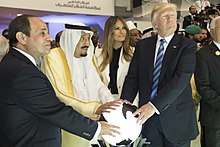
As part of the Riyadh Summit in late May 2017, many world leaders, including US President Donald Trump visited the region. Trump gave strong support for Saudi Arabia's efforts in fighting against states and groups allied with Iran and the Muslim Brotherhood, leading to an arms deal between the countries. The Business Insider reported that "Elliott Broidy a top fundraiser for President Donald Trump; and George Nader, Broidy's business partner ... pushed for anti-Qatar policies at the highest levels of government, and expected large consulting contracts from Saudi Arabia and the UAE."[28] Trump's support may have induced other Sunni states to fall in line with Saudi Arabia to take a stance against Qatar.[18] Trump's public support for Saudi Arabia, according to The New York Times, emboldened the kingdom and sent a chill through other Gulf states, including Oman and Kuwait, that fear that any country that defies the Saudis or the United Arab Emirates could face ostracism as Qatar had.[29] The Saudi-led move was at once an opportunity for the GCC partners and Egypt to punish their adversaries in Doha, please their allies in Washington, and remove attention from their own shortcomings and challenges.[30]
Hacking of Qatari websites
According to Qatar-based Al Jazeera and the American FBI, the Qatar News Agency website and other government media platforms were hacked in May 2017, where hackers posted fake remarks on the official Qatar News Agency attributed to the Emir of Qatar, Sheikh Tamim bin Hamad Al Thani, that expressed support for Iran, Hamas, Hezbollah, and Israel.[31] The emir was quoted as saying: "Iran represents a regional and Islamic power that cannot be ignored and it is unwise to face up against it. It is a big power in the stabilization of the region."[32][33] Qatar reported that the statements were false and did not know their origin.[18] Despite this, the remarks were widely publicized in the various Arab news media, including UAE-based Sky News Arabia and Saudi-owned Al Arabiya.[31] On 3 June 2017, the Twitter account of Bahraini foreign minister Khalid bin Ahmed Al Khalifa was hacked.[34]
Initially alleged intelligence gathered by the US security agencies indicated that Russian hackers were behind the intrusion first reported by the Qataris.[35][36] However, a US official briefed on the inquiry told the New York Times that it "was unclear whether the hackers were state-sponsored"[37] and The Guardian diplomatic editor Patrick Wintour reported that "it is believed that the Russian government was not involved in the hacks; instead, freelance hackers were paid to undertake the work on behalf of some other state or individual."[36] A US diplomat said that Russia and its ally Iran stood to benefit from sowing discord among US allies in the region, "particularly if they made it more difficult for the United States to use Qatar as a major base."[37] The FBI sent a team of investigators to Doha to help the Qatari government investigate the hacking incident.[38] Later, the New York Times reported that the hacking incidents may be part of a long-running cyberwar between Qatar and other Gulf countries that was only revealed to the public during the recent incidents, and they noted how Saudi and UAE media picked up the statement made by the hacked media in less than 20 minutes and began interviewing many well-prepared commentators against Qatar.[39]
US intelligence agencies believe that the hacking was done by the United Arab Emirates, according to a Washington Post article published on 16 July.[40] The intelligence officials stated that the hacking was discussed among Emirati officials on 23 May, one day before the operation took place.[41] The UAE denied any involvement in the hacking.[42] It was announced on 26 August 2017, that five individuals allegedly involved in the hacking were arrested in Turkey.[43]
Hacking of UAE ambassador's email
In May 2017, the email account of the UAE's ambassador to the US, Yousef Al-Otaiba, was hacked. The emails were reported as "embarrassing" by Al Jazeera because they showed links between the UAE and the US-based Foundation for Defense of Democracies.[44] Arab countries saw the media coverage of the alleged email hack as a provocation and a move orchestrated by Qatar,[45] and deepened the rift between the two sides.[46] On 9 June, Al Jazeera's media network was the victim of a cyber attack across all its platforms.[47] According to The Intercept, Yousef al-Otaiba has been reportedly linked to buy influence for UAE-led campaigns in the White House.[48]
Severance of diplomatic and economic ties
Between 5 and 6 June 2017, Saudi Arabia, the UAE, Yemen, Egypt, the Maldives, and Bahrain all separately announced that they were cutting diplomatic ties with Qatar; among these Bahrain was the first to announce the severing of ties at 02:50 GMT in the early morning of 5 June.[49][50][51][52][53][54]
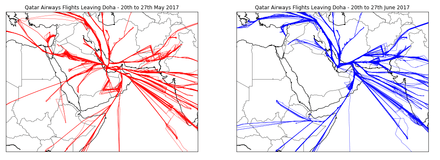
A variety of diplomatic actions were taken. Saudi Arabia and the UAE notified ports and shipping agents not to receive Qatari vessels or ships owned by Qatari companies or individuals.[55] Saudi Arabia closed the border with Qatar.[55] Saudi Arabia restricted its airspace to Qatar Airways. Instead, Qatar was forced to reroute flights to Africa and Europe through Iranian airspace.[56] Saudi Arabia's central bank advised banks not to trade with Qatari banks in Qatari riyals.[57]
Qatar verbally criticized the ban. The Foreign Ministry of Qatar criticized the ban, arguing that it undermined Qatar's sovereignty.[58] The foreign minister of Qatar, Mohammed bin Abdulrahman Al-Thani, said that Saudi statements regarding Qatar were contradictory: on the one hand, Saudi Arabia claimed Qatar was supporting Iran, on the other hand, it claimed Qatar was funding Sunni extremists fighting against Iran.[59]
Saudi Arabia's move was welcomed by United States president Donald Trump despite a large US presence at the Al Udeid Air Base, the primary base of US air operations against the Islamic State of Iraq and the Levant.[60] However, Secretary of State Rex W. Tillerson and Defense Secretary James Mattis worked on de-escalating the situation.[61] Tillerson, as the CEO of ExxonMobil, was acquainted with the current and previous emirs of Qatar.[62] A number of countries in the region, including Turkey, Russia and Iran, called for the crisis to be resolved through peaceful negotiations.
All GCC countries involved in the announcement ordered their citizens out of Qatar.[63] Three Gulf states (Saudi Arabia, UAE, Bahrain) gave Qatari visitors and residents two weeks to leave their countries.[58] The foreign ministries of Bahrain and Egypt gave Qatari diplomats 48 hours to leave their countries.[64][52] Qatar was expelled from the Saudi Arabian-led intervention in Yemen and Yemen's government itself has cut ties.[58] Kuwait and Oman remained neutral.[65]
Kuwaiti mediators in Riyadh were presented with a list of Saudi demands of Qatar. These included cutting off all links with Iran and expelling resident members of Hamas and the Muslim Brotherhood, shutting down the Al-Jazeera network, to stop "interfering" in foreign countries' affairs and to cease any funding or support for terrorist organisations.[66]
Diplomatic activity
As of 10 August 2019, seven sovereign governments have not restored diplomatic ties with Qatar.[67][68][69][70]
The Tobruk-based government of Libya claimed to have cut diplomatic ties with Qatar despite having no diplomatic representation in that country.[72][73][74]
The semi-autonomous Somali regions of Puntland, Hirshabelle, and Galmudug each issued statements cutting ties with Qatar, in opposition to the neutral stance of the federal government of Somalia.[75]
As of 10 August 2019, two countries still have downgraded diplomatic ties with Qatar without fully cutting relations.[72]
Other countries made statements condemning Qatar, including Gabon[78] and Eritrea.[79]
Multiple countries, the European Union[81][82] and the United Nations[83] called for resolution of the diplomatic crisis through dialogue:

.svg.png)

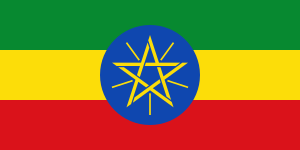


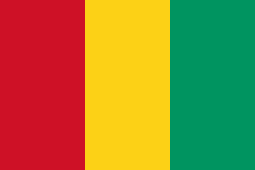




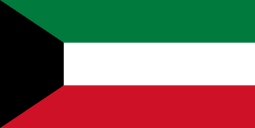


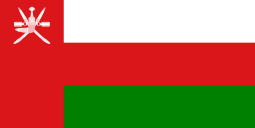


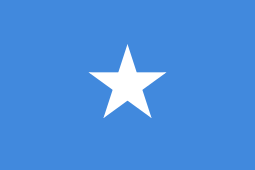
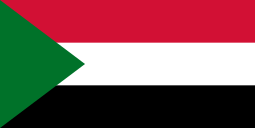





Hassan al-Thawadi, secretary general of the Qatar World Cup supreme committee, has stated that projects are progressing as scheduled for the 2022 FIFA World Cup. Qatar's only land border and air and sea routes have been cut off by Bahrain, Egypt, Saudi Arabia and the United Arab Emirates (UAE). As the blockade came into play, World Cup organizers were asked to investigate a "Plan B", FIFA however has confidence in not exploring a "Plan B" for an alternate 2022 host. According to Thawadi, all these logistical obstacles are being overcome and building progress is continuing with only minimal cost increases, in preparation for the first World Cup in the Middle East.[110]
Global reactions
United States
%2C_May_2017.jpg)
.jpg)
United States President Donald Trump claimed credit for engineering the diplomatic crisis in a series of tweets.[112] On 6 June, Trump began by tweeting: "During my recent trip to the Middle East I stated that there can no longer be funding of Radical Ideology. Leaders pointed to Qatar – look!"[113][112] An hour and a half later, he remarked on Twitter that it was "good to see the Saudi Arabia visit with the King and 50 countries already paying off. They said they would take a hard line on funding extremism, and all reference [sic] was pointing to Qatar. Perhaps this will be the beginning of the end to the horror of terrorism!"[114][115][116] This was in contrast to attempts by the Pentagon and the Department of State to remain neutral. The Pentagon praised Qatar for hosting the Al Udeid Air Base and for its "enduring commitment to regional security." US Ambassador to Qatar, Dana Shell Smith, sent a similar message.[117][118] Earlier, the US Secretary of State had taken a neutral stance and called for dialogue.[119]
On 8 June, President Donald Trump, during a phone call with the Emir of Qatar Tamim bin Hamad Al Thani, offered to act as a mediator in the conflict with a White House meeting between the parties if necessary.[120] The offer was declined, and a Qatari official stated, "The emir has no plans to leave Qatar while the country is under a blockade."[121] On 9 June, Trump once again put the blame on Qatar, calling the blockade "hard but necessary" while claiming that Qatar had been funding terrorism at a "very high level" and described the country as having an "extremist ideology in terms of funding."[122] This statement was in conflict with Secretary of State Tillerson's comments on the same day, which called on Gulf states to ease the blockade.[123][122] In 13 June 2017 after meeting with Tillerson in Washington, Saudi Foreign Minister Adel al-Jubeir stated that there was "no blockade" and "what we have done is we have denied them use of our airspace, and this is our sovereign right," and that the King Salman Centre for Humanitarian Aid and Relief would send food or medical aid to Qatar if needed.[124] The following day, Trump authorized the sale of $12 billion of U.S. weapons to Qatar.[125]
On 21 June 2017, Trump told a crowd in Iowa that "We cannot let these incredibly rich nations fund radical Islamic terror or terrorism of any kind", noting that after his visit to Riyadh in May 2017 to meet with Saudi King Salman and urge an end to terror funding, "He has taken it to heart. And now they're fighting with other countries that have been funding terrorism. And I think we had a huge impact."[126][127]
Other countries
Israel's former defense minister, Avigdor Lieberman, described the situation as an "opportunity" for Israel, stating, "Some [Arab countries'] interests overlap with Israeli interests, including the issue with al-Jazeera." He went on to describe al-Jazeera as an "incitement machine" and "pure propaganda." Israeli Prime Minister Benjamin Netanyahu has demanded al-Jazeera shut down its offices in Israel.[128]
Reports that Mauritius had cut ties with Qatar were refuted by the Mauritian government.[129][130] A report in the Saudi Gazette incorrectly stated that Mauritius had broken off ties with Qatar and that Mauritius' Vice Prime-Minister had issued a communiqué pledging his country's support for Saudi Arabia. This prompted further erroneous reports by other outlets. However, Mauritian Vice Prime Minister Showkutally Soodhun in an interview with Le Défi Media Group of Mauritius refuted claims that he had issued any such communiqué, and Mauritius' Ministry of Foreign Affairs issued a statement that Mauritius continued to maintain diplomatic relations with Qatar.[129][130]
Pakistan stated that it had no plans to cut diplomatic relations with Qatar.[131] The National Assembly passed a resolution urging all countries to "show restraint and resolve their differences through dialogue."[101] The Pakistani Federal minister for Petroleum and Natural Resources said that "Pakistan will continue to import liquefied natural gas (LNG) from Qatar."[132] A six-member Qatari delegation headed by a special envoy of the Qatari Emir visited Pakistan and asked Pakistan to play a positive role in resolving the diplomatic crisis former, and the Prime Minister of Pakistan, Nawaz Sharif, was quoted as saying that "Pakistan would do 'all it can' to help resolve the crisis," as well as calling on the Muslim world to play a role in ending hostilities.[133] A TRT report stated that Pakistan would deploy 20,000 troops in Qatar, which the Pakistani foreign ministry denied.[134]
The Philippines suspended the deployment of migrant workers to Qatar on 6 June 2017.[135] However, the next day, they allowed the deployment of returning workers and those with an Overseas Employment Certificate, but still maintained the suspension of the deployment of new workers.[136] The suspension was later fully lifted on 15 June.[137]
On 8 June 2017, Egypt's deputy UN Ambassador Ihab Moustafa called for the United Nations Security Council to launch an investigation into accusations that Qatar "paid up to $1 billion to a terrorist group active in Iraq" to free 26 Qatari hostages, including members of its royal family, which payment would violate UN resolutions. The Qataris were kidnapped on 16 December 2015 from a desert camp for falcon hunters in southern Iraq. The hostages were released eighteen months later in April 2017. Qatari diplomats responded to the Egyptian calls for an investigation by reaffirming their commitment to the UN resolutions towards eliminating the financing of terrorism.[138][139]
In June 2017, the government of Qatar hired American attorney and politician John Ashcroft to lobby on its behalf and help the state deny international allegations of supporting terror.[140][141][142][143]
On 24 November 2017, deputy chief of Dubai Police Lieutenant General Dhahi Khalfan, blamed the 2017 Sinai attack on Al-Jazeera's reporting and called for the bombing of Al-Jazeera's headquarters by the Saudi-led coalition.[144][145]
Impact
Logistical implications
On 6 June 2017, Emirates Post of UAE halted postal services to Qatar.[146]
Nearly 80 percent of Qatar's food requirements come from Persian Gulf Arab neighbors, with only 1 percent being produced domestically and even imports from outside the Gulf states usually crossing the now closed land border with Saudi Arabia.[147] Immediately after the cutting of relations, local reports indicated residents swarmed grocery stores in hopes of stockpiling food. Many food delivery trucks were idled along the Saudi-Qatari border. On 8 June 2017, Qatari Foreign Minister Sheikh Mohammed bin Abdulrahman al-Thani said, "We're not worried about a food shortage, we're fine. We can live forever like this, we are well prepared." Qatar has been in talks with both Turkey and Iran to secure supply of food. On 11 June 2017, Iran sent four cargo planes with fruit and vegetables and promised to continue the supply.[148] Turkey has pledged food and water supplies to go along with their troop deployment at their Turkish military base in Qatar.[121]
As part of the Qatari government's response to lost food imports, it provided support to domestic agricultural company Baladna, which built a new dairy farm with imported cattle that was planned to produce enough milk to fulfill domestic demand for dairy products by June 2018.[149]
Air travel
All airlines based in these countries, including Emirates, suspended flights to and from Qatar.[150][151] Gulf Air,[152] EgyptAir,[153] flydubai, Air Arabia, Saudi Arabian Airlines and Etihad Airways suspended their flights to and from Qatar.[154] Bahrain,[155] Egypt, Saudi Arabia, and the United Arab Emirates are also banning overflights by aircraft registered in Qatar (A7). Instead Qatar has rerouted flights to Africa and Europe via Iran,[56] paying a “hefty” overflight fee for each such flight.[156]
Qatar Airways in response also suspended its flight operations to Saudi Arabia, the UAE, Egypt, and Bahrain.[154][157]
Pakistan International Airlines sent special flights to bring back over 200 Pakistani pilgrims stuck at Doha airport.[158] Over 550 Pakistani pilgrims in Doha were subsequently flown to Muscat.[159]
Private jet travel is also being impacted by the crisis. Business aviation officials said private flights between Qatar and the countries that cut diplomatic ties now need to make a technical stop in a third country. Aircraft registered in Qatar cannot fly to the countries that cut diplomatic ties and vice versa. While business jet operators can request a nonstop routing, two officials said requests so far have been turned down necessitating a stop in a third country.[160]
Due to the blockade of Qatar Airways from the airspace of Saudi Arabia, the UAE, Bahrain and Egypt, Oman Air has taken up a significant role transporting travelers from and to Doha, mostly through Iranian airspace, while still allowing Qatari passport holders to book flights. The travel embargo has had a significant impact on foreign nationals living and working in Qatar, with about 100,000 Egyptians and citizens from other countries stranded there, unable to book direct flights or obtain travel documents for their return.[161] Per request from Qatar, the blockade was under review by the International Civil Aviation Organization (ICAO), a UN-agency seeking "consensus-based solutions" for the resolution of the crisis.
On 31 July 2017, the agency asserted its neutrality in the conflict and announced that Qatar Airways will have access to three contingency routes over international waters in early August based on a preliminary agreement reached with the Saudi aviation authority (GACA) early that month. The ICAO, based in Montreal, also reminded all member countries to comply with the 1944 Chicago Convention on International Civil Aviation and its agenda.[162]
Shipping
The United Arab Emirates banned Qatar-flagged ships from calling at Fujairah. It also banned vessels from Qatar from the port and vessels at the port from sailing directly to Qatar.[163] Similar restrictions were put in place at Jebel Ali, which pre-boycott used to handle over 85% of shipborne cargo for Qatar.[156] Bahrain, Egypt and Saudi Arabia also banned Qatar-flagged ships from their ports.[164]
On 8 June 2017 shipping giant Maersk was unable to transport in or out of Qatar entirely. Due to Qatar's shallow ports, large cargo ships are required to dock at Jebel Ali or other nearby ports where a feeder service transports the goods into Qatar.[165] In response, Maersk and Swiss-based MSC[166] vessels for Qatar were rerouted to Salalah and Sohar in Oman.[167] Particularly smaller shipments of perishable and frozen foods have taken that route.
On 12 June 2017, Chinese shipping company COSCO announced suspension of services to and from Qatar. Taiwan's Evergreen Marine and Hong Kong's Orient Overseas Container Line have already suspended services.[168]
Media ban
Hamad Saif al-Shamsi, the Attorney-General of the United Arab Emirates announced on 7 June that publishing expressions of sympathy towards Qatar through social media, or any type of written, visual or verbal form is considered illegal under UAE's Federal Penal Code and the Federal law on Combating Information Technology Crimes. Violators of this offense face between 3 and 15 years imprisonment, a fine of up to 500,000 emirati dirhams ($136,000) or both.[169] Bahrain also issued a similar statement with a penalty up to 5 years imprisonment and a fine.[170]
Saudi Arabia, Egypt, Bahrain, and the UAE all blocked access to Qatari news agencies, including the controversial Qatar-based Al Jazeera.[171] Saudi Arabia shut down the local office of Al Jazeera Media Network.[55] The BBC speculated that changes to Al-Jazeera would be a necessary part of any peaceful resolution.[172]
The Qatar-based beIN Sports channels (a spin-off of Al Jazeera) were also initially banned in June in the UAE.[173] The following month, the UAE restored normal access to beIN Sports channels via its local telecom providers.[174][175] In Saudi Arabia, the channels remain banned, while a large-scale pirate decryption operation known as "beoutQ" has made the channels' content available.[176][177][178][179] In 2018, in parallel with the diplomatic crisis and piracy issues, Saudi officials also began to accuse beIN Sports of having a monopoly position in sports broadcasting in the region, including revoking its broadcast licenses based on accusations of anti-competitive behaviour, and pulling its rights to the Asian Football Confederation in the Kingdom in 2019. beIN Sports has considered the moves to be politically-motivated,[180][181][182] and has accused beoutQ of operating from Saudi Arabia.[183] In May 2020, the Guardian revealed that World Trade Organization (WTO) had recognized Saudi Arabia as the main offender in regulating beIN’s copyright protected content via beoutQ. It also disclosed that the Premier League has received the 130-page WTO’s final report and made submissions against the gulf nation, as a part of its legal process.[184] In June 2020, UEFA welcomed WTO report on Saudi piracy and recognized beoutQ as the culprit behind illegal streaming of copyright protected content. “What is clear is that beoutQ’s broadcasts constitute piracy of UEFA’s matches and as such, are illegal. BeoutQ was hosted on frequencies transmitted by Arabsat and was promoted and carried out by individuals and entities subject to Saudi Arabia’s territorial jurisdiction,” the union said.[185]
Finances
The International Monetary Fund said it was too soon to judge the economic impact of the diplomatic crisis.[186] Standard & Poor's downgraded Qatar's debt by one notch from AA to AA-.[187] Qatar's stock market dropped 7.3% on the first day of the crisis, and reached a 9.7% drop by 8 June 2017.[188] Additionally, in the first months following the crisis the government of Qatar injected $38.5 billion, which was equivalent to 23% of the country's GDP, to support the country's economy and its banking sector.[189]
As per S&P Global Ratings, banks in Qatar are strong enough to survive a withdrawal of all Gulf country deposits.[190]
Despite the ongoing diplomatic blockade led by Saudi Arabia, international banks like HSBC, Goldman Sachs and others are trying to repair their ties with Qatar by building stronger financial and business relations. Saudi Arabia and the United Arab Emirates informally warned the bankers not to have close relations with Doha or else there would be consequences.[191]
On 20 January 2019, Sheikh Tamim bin Hamad Al Thani attended the opening session of the Arab Economic Summit in Beirut, Lebanon. This helped Qatar increase its influence and soft power in the region. Sheikh Tamim Bin Hamad Al Thani and Mauritanian President Mohamed Ould Abdel Aziz were the only two Arab leaders to attend the summit. Since Sheikh Tamim was the only GCC leader to attend, he received praise from the President of Lebanon himself, Michel Aoun. Hilal Khashan, a professor of political science at the American University of Beirut, said “He became the star of the summit."[192]
Energy
Qatar is a global leader in liquefied natural gas production. Despite the severing of ties, Qatari natural gas continues to flow to the UAE and Oman through Abu Dhabi based Dolphin Energy's pipeline.[193] The pipeline meets about 30–40 percent of UAE's energy needs.[194] Shipping constraints from the crisis have also rerouted multiple shipments of oil and gas to and from the Gulf, which has caused reverberations in many local energy markets. On 8 June 2017, gas futures spiked nearly 4 percent in the United Kingdom, which had nearly a third of all its imported gas arriving from Qatar.[195] A secondary effect of the dispute has been on worldwide supplies of helium, which is often extracted from natural gas. Qatar is the world's second largest supplier of helium (the US ranks first).[196]
In March 2019, Qatar lodged a complaint to International Atomic Energy Agency regarding the United Arab Emirates Barakah nuclear power plant, stating that it poses a serious threat to regional stability and the environment. The UAE denied that there are safety issues with the plant, which is being built by Korea Electric Power Corporation (KEPCO) with operation by French utility Électricité de France, and stated “The United Arab Emirates ... adheres to its commitment to the highest standards of nuclear safety, security and non-proliferation.”[197]
23rd Gulf Cup
The 23rd Arabian Gulf Cup was scheduled to be hosted in Qatar. In November 2017, Saudi Arabia, United Arab Emirates, and Bahrain pulled out of the Gulf Cup due to the Qatar boycott.[198] On 7 December 2017, it was announced that Kuwait will host the football tournament after Saudi Arabia, United Arab Emirates, and Bahrain all withdrew because of the diplomatic crisis.[199]
Qatari military relations

On 7 June 2017, the Turkish parliament passed, with 240 votes in favour and 98 against, a legislative act first drafted in May allowing Turkish troops to be deployed to a Turkish military base in Qatar.[200][201] During a speech on 13 June 2017, the President of Turkey, Recep Tayyip Erdoğan, condemned the boycott of Qatar as "inhumane and against Islamic values" and stated that "victimising Qatar through smear campaigns serves no purpose".[124] On 23 June 2017, Turkey rejected demands to shut down its military base in Qatar.[202]
Qatar hosts about 10,000 US troops at Al Udeid Air Base, which houses the forward operating base of United States Central Command that plays a commanding role in US airstrikes in Syria, Iraq, and Afghanistan.[203][116][204] A Pentagon spokesperson claimed the diplomatic crisis would not affect the US military posture in Qatar.[116][112]
On 10 and 11 November 2018, the Italian Air Force along with the Qatari Display Team, perform an airshow at the corniche that confirms the bonds of friendship between Italy and Qatar.[205]
On 30 January 2018 an inaugural United States-Qatar Strategic Dialogue meeting was held, co-chaired by U.S. Secretary of State Rex Tillerson, U.S. Secretary of Defense Jim Mattis, Qatari Deputy Prime Minister and Minister of State for Defence Affairs[206] Khalid al-Attiyah and Qatari Deputy Prime Minister and Foreign Minister Mohammed bin Abdulrahman Al Thani. The meeting expressed the need for an immediate resolution of the crisis which respects Qatar's sovereignty. In a Joint Declaration on Security Cooperation, the United States expressed its readiness to deter and confront any external threat to Qatar's territorial integrity. Qatar offered to help fund the expansion of facilities at US bases in Qatar.[207][208]
On 25 March 2018, the United States Central Command (CENTCOM) officially denied rumours that the Incirlik Air Base in Turkey and the Al Udeid Air Base in Qatar will be closed due to the ongoing regional conflict.[209]
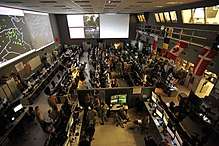
On January 2018, Qatar's ambassador was in talks with Russia with the intent to purchase S-400 surface-to-air missiles. Both countries signed an agreement on military and technical cooperation in 2017. In May 2018, the French daily newspaper Le Monde reported that King Salman of Saudi Arabia would take military action if Qatar installed the Russian air defence system. However, a senior Russian official remarked the system would still be delivered even against the will of Saudi Arabia.[210] The Saudis were themselves approaching Russia to improve economic and military ties in 2017, but talks relating to the arms deal were hindered by concerns the United States and Saudi Arabia had with regard to the Russian position towards Iran's military and strategic involvement in the Middle East.[211]
On June 2018, Qatar expressed its wish to join NATO.[212] However, NATO declined membership, stating that only additional European countries could join according to Article 10 of NATO's founding treaty.[213] Qatar and NATO have previously signed a security agreement together in January 2018.[214]
On 18 September 2018, Qatar finalised a deal to purchase Eurofighter Typhoon and BAE Hawk aircraft in a deal reported as being worth £5Bn.[215]
In June 2019, as Qatar completed two years under the diplomatic embargo, the country received its first five of the 36 purchased Rafale fighter jets from France. The first aircraft was formally handed to Qatar in February 2019, but was kept in France itself before being delivered on 5 June 2019.[216]
Arab League Council 2017
During the 148th Session of the Arab League Council at the level of Foreign Ministers which was held in Cairo, Qatar’s State Minister for Foreign Affairs, Sultan Al Muraikhi, got into a heated argument with Saudi delegate Ahmad Al Qattan. Al Muraikhi said: "Ahmad Al Qattan's tone was very threatening and I don't think he is capable of being responsible for his words." Ahmad Al Qattan interrupted Al Muraikhi, and said “No I am capable.” Things escalated when Al Muraikhi said “When I speak, you stay quiet.” Al Qattan replied, “No you stay quiet.” The Iraqi delegate tried to be the mediator in this back and forth argument. The ministers of the three blockading countries of the United Arab Emirates, Bahrain and Egypt had their say by backing Ahmad Al Qattan. This was all caused after Al Muraikhi gave a short speech about how Qatar had to go back to supporting Iran after it cut its ties to support Saudi Arabia. He adds that Saudi Arabia brought in a person from the Qatari royal family and made him look like he was the future ruler of Qatar. The argument continued for around forty minutes.[217]
2019 Asian Cup
During the semi-final match between the Qatar national football team and the tournament hosts the United Arab Emirates, the UAE supporters threw shoes and bottles onto the pitch. This conduct was preceded by booing the Qatari national anthem. Qatar won 4–0, paving the way to their first Asian Cup final and eventual title.[218][219][220][221]
A British-Sudanese football fan was allegedly beaten by fans for wearing a Qatar football shirt to a match in which Qatar was playing and then, after investigation by the UAE police, arrested for wasting police time and making false statements of being assaulted.[222] According to The Guardian, the fan was arrested for wearing a Qatar football shirt.[223][224][225] The claim was denied by UAE authorities who stated the fan was arrested for wasting police time and making false assault claims to the police. The UAE police said that the fan had admitted to making false statements. A UAE official in London stated “He was categorically not arrested for wearing a Qatar football shirt. This is instead an instance of a person seeking media attention and wasting police time.”[226][227][224][225] According to photos shown by The National, fans were seen waving the Qatari flag and wearing Qatari football shirts without any instances of arrests in the final.[228] According to The New York Times, the UAE accuses Qatar of fielding ineligible players due to them being not originally Qatari. The players accused were the competitions' top scorer Almoez Ali, a Sudan born striker, as well as Bassam Al-Rawi, an Iraq born defender.[229]
Demands on Qatar and responses
On 22 June 2017, Saudi Arabia, the United Arab Emirates (UAE), Egypt and Bahrain issued Qatar a list of 13 demands through Kuwait, which is acting as a mediator, that Qatar should agree in full within 10 days, which expired on 2 July 2017. According to reports on 23 June, these demands included:[230][231][127]
- Closing Al-Jazeera and its affiliate stations.
- Closing other news outlets that Qatar funds, directly and indirectly, including Arabi21, Rassd, Al-Araby Al-Jadeed and Middle East Eye.
- Closing the Turkish military base in Qatar, and terminate the Turkish military presence and any joint military cooperation with Turkey inside Qatar.
- Reducing diplomatic relations with Iran. Only trade and commerce with Iran that complies with US and international sanctions will be permitted.[232]
- Expelling any members of the Islamic Revolutionary Guard Corps (IRGC) and cutting off military and intelligence cooperation with Iran.[233]
- "Qatar must announce it is severing ties with terrorist, ideological and sectarian organizations including the Muslim Brotherhood, Hamas, the Islamic State of Iraq and the Levant (ISIL), Al-Qaeda, Hezbollah, and Jabhat Fateh al Sham, formerly al Qaeda's branch in Syria" according to one Arab official.
- Surrendering all designated terrorists in Qatar, and stopping all means of funding for individuals, groups or organisations that have been designated as terrorists.
- Ending interference in the four countries' domestic and foreign affairs and having contact with their political oppositions.
- Stopping granting citizenship to wanted nationals from Saudi Arabia, the United Arab Emirates, Egypt and Bahrain.
- Revoking Qatari citizenship for existing nationals where such citizenship violates those countries' laws.[232]
- The payment of reparations for years of alleged wrongs.
- Monitoring for 10 years.[230]
- Aligning itself with the other Gulf and Arab countries militarily, politically, socially and economically, as well as on economic matters, in line with an agreement reached with Saudi Arabia in 2014.[232]
According to a report by the Qatar-owned Al-Jazeera, "Qatari officials immediately dismissed the document as neither reasonable or actionable." Iran denounced the blockade. US Secretary of State Rex Tillerson said that some of the demands would be very hard to meet but encouraged further dialogue.[234]
On 3 July, Saudi Arabia accepted a Kuwaiti request for the deadline to be extended by 48 hours.[235]
On 5 July, foreign ministers from Egypt, Saudi Arabia, United Arab Emirates and Bahrain met in Cairo after receiving a response from Qatar to their list of demands. The meeting aimed to resolve the dispute ended in a stalemate when Saudi foreign minister Adel al-Jubeir said that the political and economic boycott of Qatar will remain until it changes its policies.[236] Also on the same day, the Saudi-led bloc said it no longer insisting it to comply with its 13 specific demands they tabled last month. Instead, it asked Qatar to accept six broad principles, which includes commitments to combat terrorism, extremism, to end acts of provocation, and incitement.[1]
However, by 30 July 2017, the 13 demands had been reinstated.[237]
See also
References
- "Saudi-led Bloc". BBC. 19 July 2017. Retrieved 2 December 2017.
- "Arab coalition suspends Qatar's participation in Yemen". Al Arabiya English. 5 June 2017. Retrieved 20 August 2017.
- "Jordan Seeks Middle Ground in Mideast Rift". Voice of America.
- "The implications of the Qatar-Turkey alliance". 18 June 2017. Retrieved 18 June 2017.
- "Iran sends five plane loads of food as Kuwait says Qatar 'ready' to listen". 11 June 2017. Retrieved 18 June 2017.
"Iran: Hassan Rouhani condemns 'siege of Qatar'". Al Jazeera. 26 June 2017. - "Qatar-Gulf crisis: Your questions answered". aljazeera.com.
- "It's a boycott, not a blockade". Gulf News. 14 June 2017. Retrieved 31 August 2018.
- "Doha's Actions May Destabilize the Region: Saudi Minister". Newsweek ME. 14 June 2017. Retrieved 2 July 2017.
- "Sheikh Tamim denies Qatar has links to terrorism". BBC. Retrieved 15 December 2018.
- "Sheikh Tamim denies Qatar has links to terrorism". Khaleej Times. 25 May 2017. Retrieved 5 June 2017.
- Collins, Gabriel. "Anti-Qatar Embargo Grinds Toward Strategic Failure" (PDF). Rice University’s Baker Institute for Public Policy.
- "Qatar says UN should play a role in resolving Gulf crisis". Fox News Channel. 27 July 2017. Retrieved 30 July 2017.
- "Qatar To Reinstate Ambassador To Iran Amid Gulf Crisis". 24 August 2017.
- "Three Years Since the Blockade, Clouds Loom Over Qatar's Apparent Victory". Crossfire KM. Retrieved 5 June 2020.
- Fisher, Max (13 June 2017). "How the Saudi-Qatar Rivalry, Now Combusting, Reshaped the Middle East". The New York Times. Retrieved 14 June 2017.
- Roberts, Dr David (5 June 2017). "Qatar row: What's caused the fall-out between Gulf neighbours?". BBC News. Retrieved 23 June 2017.
- "5 Arab Nations Move to Isolate Qatar, Putting the U.S. in a Bind". The New York Times. 5 June 2017.
- Barnard, Anne; Kirkpatrick, David (5 June 2017). "5 Arab States Break Ties With Qatar, Complicating U.S. Coalition-Building". The New York Times. Retrieved 5 June 2017.
- "Gulf allies and 'Army of Conquest". Al-Ahram Weekly. 28 May 2015.
- Mazzetti, Mark; Apuzzo, Matt (23 January 2016). "U.S. Relies Heavily on Saudi Money to Support Syrian Rebels". The New York Times.
- Kim Sengupta (12 May 2015). "Turkey and Saudi Arabia alarm the West by backing Islamist extremists the Americans had bombed in Syria". The Independent.
- Siegel, Robert (23 December 2013). "How Tiny Qatar 'Punches Above Its Weight'". NPR.
- Lendon, Brad (5 June 2017). "Qatar hosts largest US military base in Mideast". CNN. Retrieved 5 June 2017.
- Islam Hassan (31 March 2015). "GCC's 2014 Crisis: Causes, Issues and Solutions". Al Jazeera Research Center. Archived from the original on 4 September 2015. Retrieved 4 June 2015.
- Erika Solomon, The $1bn hostage deal that enraged Qatar's Gulf rivals: Doha reportedly paid al-Qaeda affiliate and Iran to win release of royal hunting party Archived 5 June 2017 at the Wayback Machine, Financial Times (5 June 2017).
- Arango, Tim (21 April 2017). "Big Ransom and Syria Deals Win Release of Royal Qatari Hunters" – via NYTimes.com.
- Roberts, David (June 2017). "A Dustup in the Gulf". Foreign Affairs.(subscription required)
- "How a top Trump fundraiser spent a year cultivating 2 crown princes to nail $1 billion in business". Business Insider. May 21, 2018.
- Landler, David E. Sanger, Mark; Schmitt, Eric (7 June 2017). "Trump Has Busy Day in Vortex of Middle East Relations". The New York Times. Retrieved 23 June 2017.
- "The Qatar Crisis: Causes, Implications, Risks, and the Need for Compromise". 13 June 2017.
- "Saudi Arabia, UAE, Egypt, Bahrain cut ties to Qatar". Al Jazeera. 5 June 2017. Retrieved 5 June 2017.
- "Hack, fake story expose real tensions between Qatar, Gulf". Fox News. 23 May 2017. Retrieved 2 December 2017.
- "Trump's 'Arab NATO' Vision is a Desert Mirage". Stratfor. 31 May 2017.
- "Bahrain minister briefly hacked after Qatar cyber attack". Phys.org. 3 June 2017. Retrieved 5 June 2017.
- Evan Perez & Shimon Prokupecz (6 June 2017). "US suspects Russian hackers planted fake news behind Qatar crisis". CNN. Retrieved 2 December 2017.
- Patrick Wintour (7 June 2017). "Russian hackers to blame for sparking Qatar crisis, FBI inquiry finds". The Guardian. Guardian Media Group. Retrieved 2 December 2017.
- Mark Landler (6 June 2017). "Trump Takes Credit for Saudi Move Against Qatar, a U.S. Military Partner". New York Times. Retrieved 2 December 2017.
- "Ministry of the Interior Statement on Piracy Crime on Qatar News Agency Website". mofa.gov.qa. Archived from the original on 21 June 2017.
- Kirkpatrick, David D.; Frenkel, Sheera (8 June 2017). "Hacking in Qatar Highlights a Shift Toward Espionage-for-Hire". The New York Times. ISSN 0362-4331. Archived from the original on 10 June 2017. Retrieved 11 June 2017.
- "UAE orchestrated hacking of Qatari government sites, sparking regional upheaval, according to U.S. intelligence officials". The Washington Post. Archived from the original on 29 July 2017. Retrieved 30 July 2017.
- "UAE arranged hacking of Qatari media: Washington Post". Al Jazeera. 16 July 2017. Archived from the original on 27 August 2017. Retrieved 27 August 2017.
- Tamara Qiblawi; Angela Dewan (27 July 2017). "UAE denies Washington Post report it orchestrated Qatar hack". CNN. Archived from the original on 27 August 2017. Retrieved 27 August 2017.
- "Qatar says five suspects in news agency hacking detained in Turkey". Reuters. 26 August 2017. Archived from the original on 27 August 2017. Retrieved 27 August 2017.
- Ahmed, Akbar Shahid (3 June 2017). "Someone Is Using These Leaked Emails To Embarrass Washington's Most Powerful Ambassador". HuffPost. Archived from the original on 3 June 2017. Retrieved 5 June 2017.
- "ANALYSIS: UAE envoy's hacked emails and Qatar's escalating Gulf rift". Al Arabiya. 4 June 2017. Archived from the original on 31 July 2017. Retrieved 5 June 2017.
- "What is behind the extraordinary Gulf dispute with Qatar?". Financial Times. 5 June 2017. Archived from the original on 3 July 2017. Retrieved 5 June 2017.
- Mills, Jen. "Al Jazeera hit by 'cyber attack on all systems'". Metro. Archived from the original on 9 June 2017. Retrieved 9 June 2017.
- "Why UAE ambassador is so much influential in DC". The Intercept. 5 June 2017. Archived from the original on 30 July 2017. Retrieved 5 June 2017.
- "Qatar-Gulf crisis: Your questions answered". Al Jazeera. 30 June 2017. Archived from the original on 28 July 2017.
- "Why Saudi Arabia and six other countries have cut ties with Qatar". News.com.au. Archived from the original on 7 June 2017. Retrieved 6 June 2017.
"Qatar row: Five countries cut links with Doha". BBC News. 5 June 2017. Archived from the original on 5 June 2017. Retrieved 5 June 2017.
Kirkpatrick, David D.; Barnard, Anne (7 June 2017). "Terrorist Attacks Pour Gas on Saudi- Iranian Rivalry and Gulf Tensions". Eurasia Diary. Archived from the original on 27 July 2017. Retrieved 11 June 2017. - Associated Press (5 June 2017). "Saudi Arabia Accuses Qatar of Backing Terrorism, Cuts Ties". NBC News. Archived from the original on 5 June 2017. Retrieved 5 June 2017.
- Wintour, Patrick (5 June 2017). "Gulf plunged into diplomatic crisis as countries cut ties with Qatar". The Guardian. Archived from the original on 5 June 2017. Retrieved 5 June 2017.
- Sengupta, Kim (12 May 2015). "Turkey and Saudi Arabia alarm the West by backing Islamist extremists the Americans had bombed in Syria". The Independent. Archived from the original on 13 May 2015.
"Qatar Pursues an Independent Foreign Policy that Clashes with the Saudi's Strategic Interests" (PDF). Eurasia Diary. 8 June 2017. Archived (PDF) from the original on 27 July 2017. Retrieved 11 June 2017.
"Saudi Diplomatic Offensive on Qatar to Barely Impact Anti-Terror Fight in Region". Sputnik International. 8 June 2017. Archived from the original on 27 July 2017. Retrieved 11 June 2017.
Kirkpatrick, Anne; Barnard, David D. (7 June 2017). "Terrorist Attacks Pour Gas on Saudi- Iranian Rivalry and Gulf Tensions". Eurasia Diary. Archived from the original on 27 July 2017. Retrieved 11 June 2017. - "Saudi Diplomatic Offensive on Qatar to Barely Impact Anti-Terror Fight in Region". Sputnik International. 8 June 2017. Archived from the original on 27 July 2017. Retrieved 11 June 2017.
- "Qatar diplomatic crisis: All the latest updates". Al Jazeera. Retrieved 6 June 2017.
- "Saudi-led Rupture With Qatar Pushes Nation into Iran's Embrace". Archived from the original on 7 June 2017.
- "Saudi central bank tells banks not to trade with Qatar banks in Qatari riyals: sources" Archived 3 October 2017 at the Wayback Machine. Reuters
- "Saudi, Egypt, UAE, Bahrain and Yemen isolate Qatar over 'terrorism' as rift deepens". Dawn. Reuters/AFP/AP. 5 June 2017. Archived from the original on 5 June 2017. Retrieved 5 June 2017.
- "Qatar: We're 'willing to talk' to resolve diplomatic crisis". Archived from the original on 6 June 2017.
- "Trump's Qatar Curveball Makes Tillerson Improvise Policy Again". Bloomberg L.P. 7 June 2017. Archived from the original on 26 August 2017. Retrieved 10 July 2017.
Jaffe, Greg; Gibbons-Neff, Thomas. "For Qataris, a U.S. air base is best defense against Trump attacks". The Washington Post. Archived from the original on 7 July 2017. Retrieved 10 July 2017. - "Trump's Qatar Curveball Makes Tillerson Improvise Policy Again". Bloomberg L.P. 7 June 2017. Archived from the original on 26 August 2017. Retrieved 5 July 2017.
- Overdahl, Stian. "Saudi and UAE Stumble Over Tiny Qatar". Archived from the original on 28 August 2017. Retrieved 16 July 2017.
- Gambrell, Jon (5 June 2017). "Arab nations cut ties with Qatar in new Mideast crisis". Associated Press. Archived from the original on 25 June 2017. Retrieved 5 June 2017.
- "Qatar: 'No justification' for cutting diplomatic ties". Al Jazeera. 5 June 2017. Archived from the original on 5 June 2017. Retrieved 5 June 2017.
- "Kuwait and Oman: As they remain silent on the Qatar-Gulf rift, what does this mean for them?". 6 June 2017. Archived from the original on 6 June 2017. Retrieved 11 June 2017.
- "Qatar crisis: Saudi Arabia insists Gulf country must meet its demands 'soon'". Archived from the original on 3 October 2017.
- "Chad and Qatar restore ties cut in wake of Arab states rift". Reuters. 21 February 2018.
- "Maldives to restore ties with Qatar and Iran". Maldivesindependent.com. Retrieved 6 February 2019.
- "Senegal restores its ambassador to Qatar". Anadolu Agency. Archived from the original on 22 August 2017. Retrieved 22 August 2017.
- "Gulf Crisis: Saudi-led bloc loses ally Senegal in boycott of Qatar". Middle East Confidential. Archived from the original on 22 August 2017. Retrieved 22 August 2017.
- "Comoros severs diplomatic relations with Qatar The official Saudi Press Agency". spa.gov.sa. Archived from the original on 15 October 2017. Retrieved 8 June 2017.
- Katie Hunt; Elizabeth Roberts; Victoria Brown (6 June 2017). "Qatar: We're 'willing to talk' to resolve diplomatic crisis". CNN. Archived from the original on 6 June 2017. Retrieved 6 June 2017.
- "Libya's eastern-based government cuts diplomatic ties with Qatar". Reute rs. 5 June 2017. Archived from the original on 19 June 2017.
- Prentis, Jamie (5 June 2017). "Beida government cuts off diplomatic relations with Qatar". Libya Herald. Archived from the original on 13 June 2017.
- "Somalia chides its regions for cutting ties with Qatar". Al Jazeera. 22 September 2017. Archived from the original on 29 September 2017.
- Djibdiplomatie1. "URGENT/COMMUNIQUE DE PRESSE". djibdiplomatie.dj. Archived from the original on 21 August 2017. Retrieved 7 June 2017.
- "Niger recalls ambassador to Qatar in solidarity with Arab states". Reuters. Archived from the original on 11 June 2017. Retrieved 10 June 2017.
- "Mauritania breaks diplomatic ties with Qatar, Gabon voices condemnation". Reuters. Archived from the original on 7 June 2017. Retrieved 10 June 2017.
- "Eritrea sides with Gulf nations against Qatar". Arab News. Associated Press. 12 June 2017. Archived from the original on 13 June 2017. Retrieved 13 June 2017.
- Tom Wheeldon (26 June 2017). "Why Turkey is backing Qatar in Gulf diplomatic crisis". France 24.
- "EU urges talks to resolve Qatar crisis". Gulf News. 24 July 2017. Archived from the original on 24 July 2017.
- "EU's Mogherini urges direct talks to end Gulf crisis". Al Jazeera. 24 July 2017. Archived from the original on 24 July 2017.
- "Deeply Concerned by Middle East Situation, Secretary-General Encourages Diplomacy to Avoid Escalating Tensions | Meetings Coverage and Press Releases". United Nations. Archived from the original on 21 July 2017. Retrieved 8 June 2017.
- "Algeria calls for dialogue to resolve Qatar row". Anadolu Agency. 6 June 2017. Archived from the original on 4 July 2017.
- "Amid Qatar boycott, Canadian firms urged to consider alternative plans". The Globe and Mail.
- "Amid Qatar crisis, China tells Iran that Gulf stability is best". Reuters. Archived from the original on 9 June 2017. Retrieved 9 June 2017.
- "Ethiopia Vows to Extend More Support for Sustainable Peace Between Qatar and the Gulf Region Countries". Awramba Times. 19 June 2017. Archived from the original on 19 June 2017. Retrieved 19 June 2017.
- "French Foreign Minister Heads to Gulf States to Help Resolve Qatar Crisis". Sputnik International. Archived from the original on 15 July 2017. Retrieved 15 July 2017.
- "France wades into Qatar row, urges end to punitive measures". The Washington Post. Archived from the original on 15 July 2017. Retrieved 15 July 2017.
- "Germany urges diplomatic solution to Qatar crisis". Reuters. Archived from the original on 20 July 2017. Retrieved 9 June 2017.
- "Guinea's president offers to mediate in Gulf crisis". NASDAQ. 11 June 2017. Archived from the original on 12 June 2017.
- "Qatar crisis: India favours constructive dialogue". The Times of India. 10 June 2017. Archived from the original on 11 June 2017. Retrieved 12 June 2017.
- "Indonesia calls for dialogue over Qatar rift with Arab states". Antara News. 5 June 2017. Archived from the original on 5 June 2017. Retrieved 15 June 2017.
- Browning, Noah (5 June 2017). "Arab powers sever Qatar ties, widening rift among US allies". Reuters. Archived from the original on 5 June 2017. Retrieved 5 June 2017.
- "Saudi Arabia, Egypt lead Arab states cutting Qatar ties, Iran blames Trump". CNBC. Reuters with AP. 5 June 2017. Archived from the original on 5 June 2017. Retrieved 5 June 2017.
- "Qatar to buy seven navy vessels from Italy for €5bn". Al Jazeera. 2 August 2017. Archived from the original on 2 August 2017. Retrieved 3 August 2017.
- "Kuwait: Qatar willing to hold dialogue on Gulf dispute". 11 June 2017. Archived from the original on 19 June 2017. Retrieved 19 June 2017.
- "Neutral Malaysia hopes to mediate Qatar crisis". The Star. 30 June 2017. Archived from the original on 30 June 2017.
- "Morocco offers to mediate Qatar-GCC crisis". Al Jazeera. 12 June 2017. Archived from the original on 12 June 2017.
- "More Oman Air flights to Qatar". 17 June 2017. Retrieved 19 June 2017.
- Chaudhry, Fahad (8 June 2017). "Middle East diplomatic crisis: lawmakers pass resolution in NA urging restraint". Dawn. Pakistan. Archived from the original on 8 June 2017. Retrieved 8 June 2017.
- "Russia Hopes Anti-Terror Efforts Unaffected by Qatar Diplomatic Row". Sputnik News. 5 June 2017. Archived from the original on 5 June 2017. Retrieved 5 June 2017.
- "Somalia: Govt Breaks Silence Over the Qatar Crisis". allAfrica. 7 June 2017. Archived from the original on 10 June 2017.
- "Sudan urges 'reconciliation' to end Gulf row with Qatar". News24. 6 June 2017. Archived from the original on 6 June 2017.
- "Sudan appeals for calm between Qatar and Gulf". Middle East Monitor. 6 June 2017. Archived from the original on 6 June 2017.
- Switzerland backs Kuwaiti efforts to resolve Gulf crisis The Peninsula. Qatar's Daily Newspaper. Retrieved 6 May 2018.
- "Tunisia follows with concern diplomatic crisis in Gulf countries". Xinhua Net. Archived from the original on 5 June 2017.
- "Turkey calls for dialogue over Qatar rift with Arab states". Reuters. 5 June 2017. Archived from the original on 5 June 2017. Retrieved 5 June 2017.
- "Venezuela rejects unjust blockade against Qatar". Gulf Times. 21 February 2019. Retrieved 20 June 2019.
- "Archived copy". Archived from the original on 8 October 2017. Retrieved 8 October 2017.CS1 maint: archived copy as title (link)
- Emmons, Alex (1 August 2018). "Saudi Arabia Planned to Invade Qatar Last Summer. Rex Tillerson's Efforts to Stop It May Have Cost Him His Job". The Intercept.
- "Qatar row: Trump claims credit for isolation". BBC. Archived from the original on 7 June 2017.
- Trump, Donald J. [@realDonaldTrump] (6 June 2017). "During my recent trip to the Middle East I stated that there can no longer be funding of Radical Ideology. Leaders pointed to Qatar – look!" (Tweet). Archived from the original on 6 June 2017. Retrieved 7 June 2017 – via Twitter.
- Trump, Donald J. [@realDonaldTrump] (6 June 2017). "So good to see the Saudi Arabia visit with the King and 50 countries already paying off. They said they would take a hard line on funding..." (Tweet). Archived from the original on 6 June 2017. Retrieved 7 June 2017 – via Twitter.
- Trump, Donald J. [@realDonaldTrump] (6 June 2017). "...extremism, and all reference was pointing to Qatar. Perhaps this will be the beginning of the end to the horror of terrorism!" (Tweet). Archived from the original on 6 June 2017. Retrieved 7 June 2017 – via Twitter.
- "The Latest: Trump says Qatar dispute could end terror". The Washington Post. Archived from the original on 6 June 2017.
- "U.S. military praises Qatar, despite Trump tweet". Reuters. 6 June 2017. Archived from the original on 7 June 2017. Retrieved 8 June 2017.
- "Trump appears to take credit for Gulf nations' move against Qatar". CNN. Archived from the original on 7 June 2017.
- "Tillerson says break with Qatar by Saudi Arabia, others won't affect counter-terrorism". CNBC. 5 June 2017. Archived from the original on 5 June 2017. Retrieved 5 June 2017.
- Gaouette, Nicole; Browne, Ryan. "Trump reverses course in Qatar call". CNN. Archived from the original on 8 June 2017. Retrieved 8 June 2017.
- "Qatar vows no surrender in Gulf crisis as U.S., Kuwait seek solution". Reuters. 8 June 2017. Archived from the original on 8 June 2017. Retrieved 8 June 2017.
- Mindock, Clark (10 June 2017). "Donald Trump accuses Qatar of funding terrorism 'at very high level'". The Independent. Archived from the original on 9 June 2017. Retrieved 10 June 2017.
- "President Trump Just Directly Contradicted His Secretary of State". Time. Archived from the original on 9 June 2017. Retrieved 9 June 2017.
- "Turkey's Erdogan decries Qatar's 'inhumane' isolation". BBC. 13 June 2017. Archived from the original on 13 June 2017. Retrieved 14 June 2017.
- Brennan, Margaret and Kylie Atwood. "Trump sells Qatar $12 billion of U.S. weapons days after accusing it of funding terrorism." CBS News. 15 June 2017. 21 January 2020.
- "Conway: Special elections a reaffirmation of Trump's agenda; Sekulow: Investigation should include Comey's leak". 21 June 2017. Archived from the original on 30 June 2017.
- Hennessy-Fiske, Molly (23 June 2017). "Will Qatar agree to Arab countries' new list of demands? Unlikely". Los Angeles Times. Archived from the original on 30 June 2017.
- "Netanyahu demands al-Jazeera offices in Israel be shut down". The Times of Israel. Archived from the original on 27 July 2017. Retrieved 30 July 2017.
- "Maurice maintient ses relations diplomatiques avec le Qatar" [Mauritius maintains its diplomatic relations with Qatar]. Indian Ocean News Network. 6 June 2017. Archived from the original on 3 July 2017. Retrieved 7 June 2017.
- "Diplomatie : Maurice maintient ses liens avec le Qatar" [Diplomacy: Mauritius maintains its links with Qatar]. Le Défi Media Group. 7 June 2017. Archived from the original on 17 July 2017. Retrieved 7 June 2017.
- "Pakistan has no plans to cut diplomatic ties with Qatar: FO". The Express Tribune. 5 June 2017. Archived from the original on 5 June 2017. Retrieved 5 June 2017.
- "Pakistan to continue import of LNG from Qatar". Dawn. Pakistan. 8 June 2017. Archived from the original on 9 June 2017. Retrieved 8 June 2017.
- Siddiqui, Dawn.com (8 June 2017). "Delegation headed by special envoy of Qatari Emir makes short visit to Pakistan". Dawn. Pakistan. Archived from the original on 3 October 2017. Retrieved 8 June 2017.
- "Pakistan denies media reports of troop deployment to Qatar". Al Arabiya Network. 11 June 2017. Archived from the original on 3 October 2017. Retrieved 11 June 2017.
- "Philippines bans deployment of workers to Qatar". Sun Star Manila. HDT, SunStar Philippines. 6 June 2017. Retrieved 6 June 2017.
- "PHL partially lifts suspension of OFW deployment to Qatar". GMA network. Archived from the original on 17 July 2017.
- Jaymalin, Mayen (16 June 2017). "DOLE lifts suspension of OFW deployment in Qatar". The Philippine Star. Archived from the original on 15 June 2017. Retrieved 16 June 2017.
- "Egypt calls for U.N. inquiry into accusation of Qatar ransom payment". Reuters. 8 June 2017. Archived from the original on 8 June 2017. Retrieved 8 June 2017.
- News, ABC. "The Latest: Egypt seeks UN probe of alleged Qatar ransom". ABC News. Archived from the original on 8 June 2017. Retrieved 8 June 2017.
- "Qatar, accused of supporting terrorism, hires ex-U.S. attorney general – Reuters". Reuters. Archived from the original on 10 June 2017. Retrieved 10 June 2017.
- "Singled Out by Trump, Qatar Hires Former Top U.S. Law Man – Bloomberg". BloombergPolitics. Archived from the original on 10 June 2017. Retrieved 10 June 2017.
- "Qatar blockade: Iran sends five planeloads of food – BBC News". BBC News. Archived from the original on 12 June 2017. Retrieved 11 June 2017.
- "Qatar Hires Former U.S. Attorney General To Rebut Terrorism Allegations". Radio Free Europe/Radio Liberty. Archived from the original on 10 June 2017. Retrieved 10 June 2017.
- "Dubai security chief calls for bombing of Al Jazeera". aljazeera.com.
- "Farsnews". en.farsnews.com.
- "Emirates Post Group halts services to Qatar". Archived from the original on 9 June 2017.
- Taylor, Adam. "Analysis | Qatar could face a food crisis in spat with Arab neighbors". The Washington Post. Archived from the original on 6 June 2017. Retrieved 7 June 2017.
- "Iran flies food to Qatar amid concerns of shortages". 11 June 2017. Archived from the original on 3 October 2017. Retrieved 11 June 2017.
- "Qatar builds dairy industry in desert as it defies Arab boycott". Reuters. 29 November 2017. Retrieved 24 January 2018.
- Carey, Glen; Fattah, Zainab (5 June 2017). "Flights Grounded as Gulf Split on Iran Leaves Qatar Isolated". Bloomberg L.P. Archived from the original on 5 June 2017. Retrieved 5 June 2017.
- "Suspension of flights between Dubai and Doha with effect from 6 June 2017". Emirates. 5 June 2017. Archived from the original on 6 June 2017.
- Nagraj, Aarti (5 June 2017). "Emirates, Etihad, Flydubai, Gulf Air and Air Arabia to suspend Qatar flights". Gulf Business. Archived from the original on 6 June 2017. Retrieved 5 June 2017.
- "EgyptAir Suspends Flights to Qatar Until Special Notice". Sputniknews.com. 5 June 2017. Archived from the original on 2 July 2017. Retrieved 5 June 2017.
- "Qatar diplomatic crisis: How it affects air travel". Al Jazeera. 5 June 2017. Retrieved 5 June 2017.
- "Flight Ban for Qatar Flights in UAE, Saudi Arabia, Bahrain, and Egypt". Flightradar24. 5 June 2017. Retrieved 5 June 2017.
- "The boycott of Qatar is hurting its enforcers". The Economist. 19 October 2017.
- "Travel Alerts | Qatar Airways". Qatar Airways. 5 June 2017. Retrieved 6 June 2017.
- "Qatar row: Over 200 Pakistani pilgrims stuck at Doha airport – Pakistan – Dunya News". dunyanews.tv. Retrieved 6 June 2017.
- Siddiqui, Naveed (6 June 2017). "550 Pakistani pilgrims stranded in Qatar flown to Muscat". Dawn. Pakistan. Retrieved 6 June 2017.
- "Private Jet Card Comparisons – Know Before You Buy Qatar's Diplomatic Crisis Is Impacting Private Jets Too". privatejetcardcomparisons.com. 6 June 2017. Retrieved 7 June 2017.
- D. Dudley (14 June 2017). ""A Winner Emerges From The Qatar Crisis: Oman's National Airline"". Forbes. Retrieved 2 December 2017.
- "Qatar Airways expected to access new flight routes". Al Jazeera News. 31 July 2017. Retrieved 2 December 2017.
- "Report: Port of Fujairah Bans Qatari-Flagged Ships". World Maritime News. Retrieved 6 June 2017.
- "More Arab Ports Deny Calls to Qatari Ships". World Maritime News. Retrieved 6 June 2017.
- Saul, Jonathan (2017). "Maersk says unable to ship Qatar bound cargo from UAE, seeks alternatives". Reuters. Retrieved 8 June 2017.
- "Hundreds of containers on their way to Qatar from Oman". Al Jazeera News. 12 June 2017. Retrieved 2 December 2017.
- "Qatar ships cargo via Oman to bypass Gulf restrictions". BBC News. Retrieved 12 June 2017.
- "Chinese shipping firm suspends services to Qatar". khaleejtimes.com. IANS. Retrieved 12 June 2017.
- "UAE bans expressions of sympathy toward Qatar: media". Reuters. Retrieved 7 June 2017.
- DeYoung, Karen (8 June 2017). "Bahrain and UAE criminalize 'sympathy' for Qatar". The Washington Post. Retrieved 9 June 2017.
- Youssef, Neveen (25 May 2017). "Qatar hacking row fuels Gulf tensions". BBC News. Retrieved 7 June 2017.
- Ponniah, Kevin (7 June 2017). "Qatar crisis: Can Al Jazeera survive?". BBC News.
- Alkhalisi, Zahraa (8 June 2017). "Blocked in Dubai: Qatar cartoon and soccer channels". CNN. Retrieved 13 August 2017.
- "UAE restores Qatar's BeIN sports network on air". Al Jazeera. 23 July 2017. Retrieved 13 August 2017.
- McCombe, Steven; Pennington, Roberta (22 July 2017). "BeIN Sports back on TV in the UAE". The National. Retrieved 13 August 2017.
- "World Cup pirates: Saudi Arabia's BeIN action threatens future of international sports broadcasting". SportsPro. Retrieved 26 August 2018.
- Wintour, Patrick (21 August 2018). "Premier League games 'screened illegally via Saudi satellite firm'". The Guardian. Retrieved 26 August 2018.
- "BeoutQ illegally shows opening Premier League and Ligue 1 games". SportsPro. Retrieved 26 August 2018.
- Panja, Tariq (9 May 2018). "The Brazen Bootlegging of a Multibillion-Dollar Sports Network". The New York Times.
- "Saudis ban beIN Sports". Advanced Television. Retrieved 26 August 2018.
- "AFC cancels BeIN Sports rights in Saudi Arabia". SportsPro Media. Retrieved 22 June 2019.
- "BeIN Sports to launch AFC legal action". SportsPro Media. Retrieved 22 June 2019.
- "BeoutQ's Riyadh HQ revealed in Al Jazeera doc, says report". SportsPro Media. Retrieved 3 October 2019.
- "Newcastle takeover in serious doubt as WTO rules pirate TV channel is Saudi". The Guardian. Retrieved 26 May 2020.
- "UEFA statement welcomes WTO report on piracy". UEFA. Retrieved 16 June 2020.
- "IMF says too soon to judge impact from Qatar, Gulf diplomatic dispute". Reuters. 8 June 2017. Retrieved 8 June 2017.
- "Standard and Poor's downgrades Qatar debt rating". Financial Review. 8 June 2017. Retrieved 8 June 2017.
- "Qatari stocks plunge 7% after Arab states cut ties". CNN. 5 June 2017. Retrieved 9 June 2017.
- Martin, Geoffrey (17 January 2019). "Everyone loses". zenith.
- "Qatar banks can survive Gulf, foreign funds withdrawal, S&P says". Arabian Business. Retrieved 12 June 2017.
- "Bankers Are Sick of Choosing Sides Between Qatar and Saudi Arabia". Bloomberg. Retrieved 17 February 2019.
- Rose, Sunniva. "Lebanon fails to attract high-level turnout for Arab economic summit". The National.
- Law, Bill (14 November 2017). "Qatar Rides Out the Blockade". IndraStra Global. New York, USA (published 9 November 2017). 003 (11): 0006. ISSN 2381-3652.
- Alkhalisi, Zahraa (7 June 2017). "Qatar keeps gas flowing to UAE despite blockade". CNNMoney. Retrieved 9 June 2017.
- Domm, Patti (8 June 2017). "Qatar fight finally spills into global energy market". Retrieved 9 June 2017.
- "Middle East turmoil is disrupting a vital resource for nuclear energy, space flight and birthday balloons". The Washington Post. 26 June 2017. Retrieved 26 June 2017.
- De Clercq, Geert (20 March 2019). "Qatar says UAE nuclear plant is threat to regional stability". Reuters.
- Editorial, Reuters. "Saudi, UAE, Bahrain to miss Qatar's Gulf Cup amid rift". U.K.
- "Gulf Cup to return to Kuwait following lifting of FIFA ban". Arab News. 8 December 2017. Retrieved 1 June 2018.
- "Turkish parliament approves troop deployment to Qatar". Al Jazeera. 8 June 2017. Archived from the original on 11 June 2017.
- Halil Celik and Alex Lantier (9 June 2017). "Turkey prepares to send troops to Qatar in conflict with Saudi Arabia". World Socialist Web Site. Archived from the original on 9 June 2017.
- Schreck, Adam; Lederman, Josh (23 June 2017). "Turkey rejects Gulf Arab states' demands over its Qatar base". Associated Press. Retrieved 23 June 2017.
- "Trump sides with Saudis, other Arab nations against Qatar". ABC News. Archived from the original on 12 June 2017.
- "Siding against ally Qatar, Trump injects US into Arab crisis". The Chronicle Herald. The Canadian Press. 6 June 2017. Retrieved 6 June 2017.
- "Doha Airshow 2018: Italian Air Force and Qatar Display Team". Ambasciata d'Italia Doha. Ambasciata d'Italia Doha.
- "Minister of State for Defence Affairs". Government Communications Office. Retrieved 6 February 2019.
- Calamur, Krishnadev (31 January 2018). "America Wins the Gulf Crisis". The Atlantic. Retrieved 9 March 2018.
- "Joint Statement of the Inaugural United States-Qatar Strategic Dialogue". U.S. Department of State. 30 January 2018. Retrieved 9 March 2018.
- "US denies leaving air bases in Turkey and Qatar". Aljazeera News/Turkey. Retrieved 26 March 2018.
- "Saudi Arabia threatens military action if Qatar deploys anti-aircraft missiles – report". Reuters. Retrieved 2 June 2018.
- Russia 'to supply S-400 system to Qatar' despite Saudi position. Al Jazeera News. Retrieved 2 June 2018.
- "Qatar eyes full NATO membership: Defense minister". The Peninsula. 5 June 2018.
- "Nato rejects Qatar membership ambition". Dhaka Tribune. 6 June 2018.
- "Qatar signs security agreement with NATO". NATO. 16 January 2018.
- BAE Systems finalises deal to sell Typhoon jets to Qatar. Reuters. Retrieved 18 September 2018.
- "Under embargo Qatar takes delivery of first Rafale jets". France 24. Retrieved 5 June 2019.
- Thrar, Abdulrahim. "فيديو.. مندوب السعودية بالجامعة العربية يهدد.. ومندوب قطر يرد: "منت بقدها"". Al Sharq.
- "Qatar 4–0 United Arab Emirates". BBC. 29 January 2019. Retrieved 1 February 2019.
- Aditya (29 January 2019). "Watch: Fans throw shoes at the Qatar players after Almoez Ali scores their second goal against the UAE in the AFC Asian Cup 2019". Fox Sports Asia. Retrieved 1 February 2019.
- "Shoes and Insults Flying, Qatar Beats U.A.E. and Advances to Asian Cup Final". The New York Times. Associated Press. 29 January 2019. Retrieved 1 February 2019.
- "Asian Cup: Qatar pelted with shoes by hostile UAE fans as they thrash hosts 4–0 to reach final". South China Morning Post. Agence France-Presse. 30 January 2019. Retrieved 1 February 2019.
- "Briton held in UAE in football shirt row". Bbc.com. 6 February 2019. Retrieved 6 February 2019.
- Taylor, Diane (5 February 2019). "British man detained in UAE after wearing Qatar football shirt to match". Theguardian.com. Retrieved 6 February 2019.
- "UK football fan held in United Arab Emirates 'for wearing Qatar shirt to match'". The Independent. 5 February 2019. Retrieved 6 February 2019.
- Taylor, Diane (6 February 2019). "UAE officials suggest detained UK football fan beat himself up". Theguardian.com. Retrieved 6 February 2019.
- "UAE denies British man detained for showing Qatar support". Reuters. 5 February 2019.
- "UAE denies arresting British national for wearing Qatar shirt". Sky Sports. 6 February 2019.
- "British football fan arrested for misleading UAE police". The National. 6 February 2019.
- Panja, Tariq (31 January 2019). "U.A.E. Accuses Qatar of Fielding Ineligible Players at Asian Cup". The New York Times. Retrieved 19 May 2019.
- "Arab states issue ultimatum to Qatar: close Jazeera, curb ties with Iran". Reuters. 23 June 2017. Retrieved 23 June 2017.
- Wintour, Patrick (23 June 2017). "Qatar given 10 days to meet 13 sweeping demands by Saudi Arabia". The Guardian. Retrieved 24 June 2017.
- AP (23 June 2017). "What are the 13 demands given to Qatar?". Retrieved 2 December 2017.
- "Arab states issue list of demands to end Qatar crisis". Al Jazeera. 11 July 2017. Retrieved 2 December 2017.
- "Archived copy". Archived from the original on 29 June 2017. Retrieved 30 June 2017.CS1 maint: archived copy as title (link)
- "Saudi-bloc gives Qatar 48 more hours to accept demands". Al Jazeera. 3 July 2017. Retrieved 2 December 2017.
- "Saudi-led group: Qatar not serious about demands". Al Jazeera. 6 July 2017. Retrieved 2 December 2017.
- Feteha, Ahmed; MacDonald, Fiona; El-Tablawy, Tarek (31 July 2017). "Qatar Crisis Is Back to Square One as Economy Shows the Strain". Bloomberg. Retrieved 8 September 2017.

